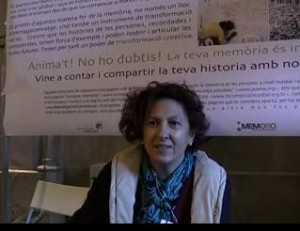Volunteering as a way of life
 In the framework of the projects “European Memories” and “Tell me about your commitment”, Fundació Desenvolupament Comunitari (FDC) have organized, together with “Memoro” and “Entrepobles”, a serie of interviews of people living in Catalunya who have been strongly involved in social struggles in the last years or even decades.
In the framework of the projects “European Memories” and “Tell me about your commitment”, Fundació Desenvolupament Comunitari (FDC) have organized, together with “Memoro” and “Entrepobles”, a serie of interviews of people living in Catalunya who have been strongly involved in social struggles in the last years or even decades.
View video “FDC Memories of the FSCat”
The Social Catalan Forum (FSCat), held in Barcelona from the 27th to the 29th of January 2010, was the starting point of the process. The aim was to collect the memory of the social struggles developped in Catalunya the last 40 or 50 years, on the basis of the life stories of those people who were involved in that struggles and who are to-day still involved, through the FSCat Process.
In this way, the memory is not only an archive, but also and directly a tool for social transformation. Indeed, we believe that the stories of the people, remembered and shared by a group of activists, get a strong power as good exemples. Therefore, they can feed and articulate the struggles to come, hence, they have a power of creative transformation.
In this movie, you will find 25 people interviews abstracts, which give an overview of the struggles in Catalunya during the last decades. We also have the orginal interviews, which are much longer. They will be downloaded in this web page or in some others in a next future. These 25 people have been selected according to the criteria of “diversity”, i.e they represent different struggles, ages, gender, etc… for sure there are people well known in Catalunya and others, less known, who are not in the movie and who would have definitively desserved the right to be there. It was not our intention to make any discrimation, but the element “chance” made that we interviewed some people and didn’t interview some others. In any case, our intention is to continue this exercice, since “the more memory, the better !” and to interview all those who are significant in Catalunya for their long history of social struggle, as well as many others, maybe not so famous, who definitely made a contribute to the peace building.
Last not least, the interviews are in Spanish or Catalan. We hope to be able in the future to subtitle them in English and offer this way these interesting stories of “volunteering as a way of life” to more and more people.


 July 1, 2011
July 1, 2011 
Wir (Berliner am 24.09 im Awo-Begegnungszentrum) finden dass dieser Text bzw. die Erfahrung, Lebensgeschichten zu sammeln, sehr interessant ist.
Sind die Geschichten in Barcelona und die in Slupsk unterschiedlich?
Grüße
Die BerlinerInnen
Claudio Cassetti
Was ist das Gemeinsame und das Unterschiedliche, wenn sich die Menschen aus Slupsk und Menschen aus Barcelona mit Geschichte beschäftigen?
Claudio Cassetti